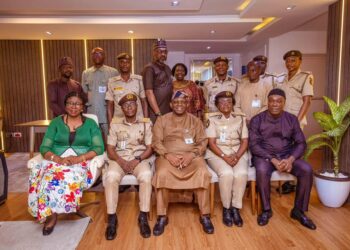
The Merchant Seafarers Association of Nigeria (MESAN) has raised concerns demanding clarification from the Nigerian Navy regarding its recent public warning against unauthorized use of naval uniforms and accoutrements.
While acknowledging the importance of preserving the integrity of the Navy’s uniforms, MESAN argued that the current approach lacks clarity and could lead to potential misuse of authority and infringement on individual rights.
In a statement signed by the Secretary General of MESAN, Captain Alfred Oniye the group criticised the recent Navy’s publication which warns the public to desist from wearing or appearing in naval uniforms for its lack of detailed descriptions of what constitutes a “naval uniform” and “accoutrements.” He believes that this vagueness can result in confusion and arbitrary enforcement.
To prevent unintentional violations, Captain Oniye urged the Navy to provide clear, specific descriptions of the uniforms and accoutrements in question.
Oniye highlighted that the Nigerian Navy cites Chapter 12, Section 110 (1) and (2) of the Criminal Code, which criminalizes unauthorized use of military uniforms. However, he emphasized that for this law to be justly enforced, the public must be adequately informed about what exactly constitutes a violation.
The group also pointed out that the Nigerian Constitution guarantees the right to personal liberty and protection from arbitrary arrest and detention (Section 35). Vague regulations on the use of naval uniforms can lead to arbitrary arrests, infringing on these constitutional rights. MESAN insisted that the Navy’s regulations must be clear and precise to prevent any potential abuse of power.
To address these concerns, MESAN suggested that the Nigerian Navy should provide comprehensive descriptions and visual representations of their uniforms and accoutrements. According to him, this should include specific details such as colors, patterns, insignia, and any other distinguishing features.
Additionally, MESAN recommended launching a public awareness campaign to educate citizens about the specific characteristics of naval uniforms.
By addressing these concerns proactively, MESAN believes the Nigerian Navy can avoid legal disputes and ensure that their regulations are both effective and respectful of individual rights. Oniye called on the Navy to respond promptly and provide the necessary clarifications to safeguard the rights of Nigerian citizens while maintaining the integrity of naval uniforms.
“Failure to provide clear and specific descriptions of their uniforms could lead to legal challenges against the Nigerian Navy. Individuals who feel their rights have been violated due to vague regulations may seek redress through the courts. This could result in legal actions for wrongful arrest, detention, or harassment, potentially leading to significant reputational and financial repercussions for the Navy” Oniye said.















